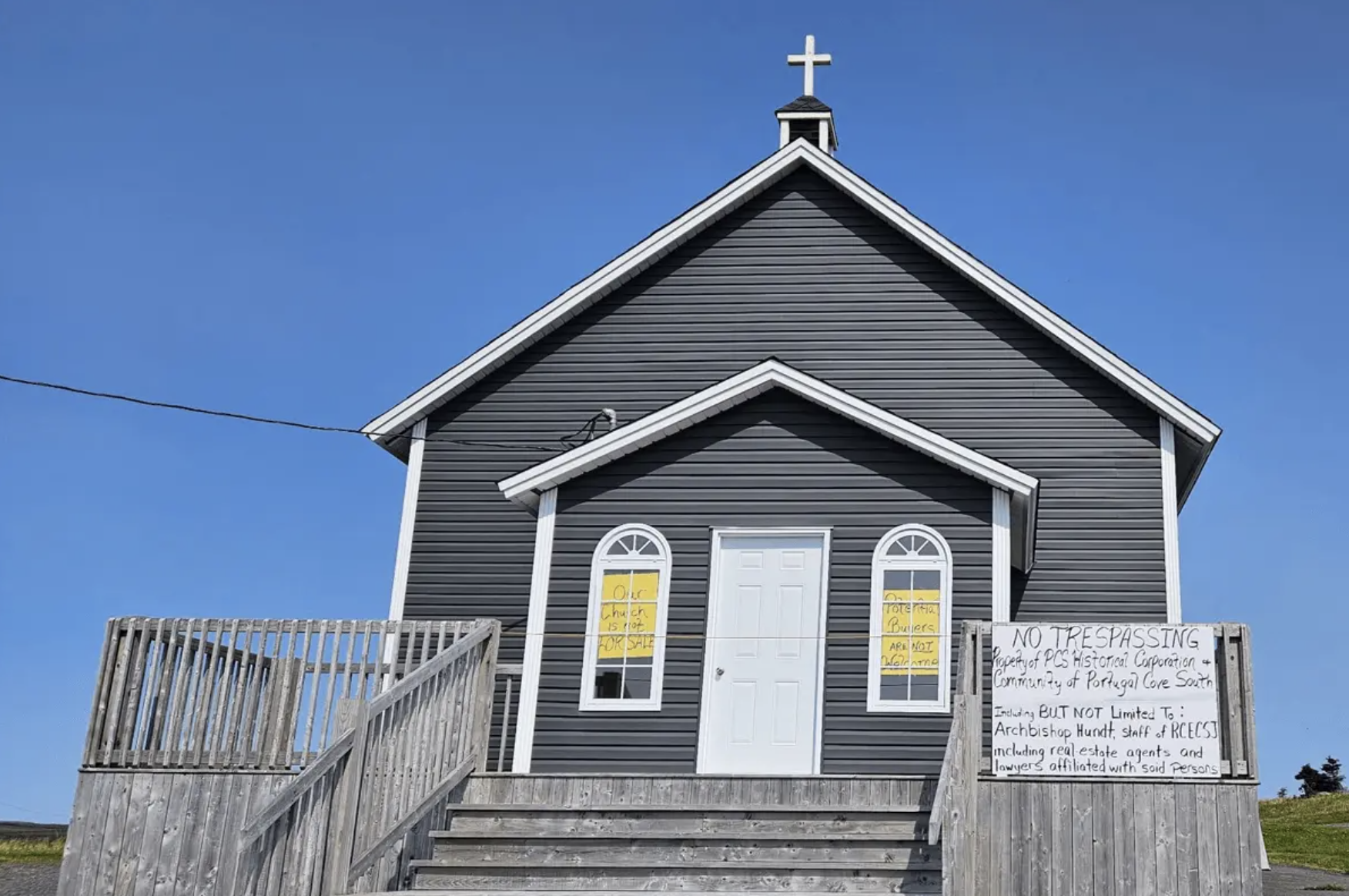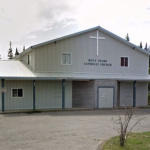PORTUGAL COVE SOUTH, NFLD. — Holy Rosary Church in Portugal Cove South is rightfully owned by the Roman Catholic Episcopal Corporation of St. John’s (RCESJ), not the fishing town’s residents, ruled a Supreme Court of Newfoundland and Labrador justice on May 21.
Judge Garrett Handrigan decreed in his written decision that the archdiocesan corporation is authorized to sell the house of worship as part of its efforts to settle over $121 million in abuse claims against the Archdiocese of St. John’s. He also granted an injunction prohibiting locals from interfering in the liquidation process.
Last September, Cynthia Power and Clarence Molloy of the Portugal Cove South Historical Corporation seized attention by boldly changing the building’s locks and putting up posters signalling that St. John’s Archbishop Peter Hundt and any potential buyer were not welcome on the premises.
Inhabitants of the coastal town on the southern Avalon Peninsula — represented by Kyle R. Rees of the O’Dea Earle law firm — argued during a May 6 hearing that the episcopal corporation failed to establish clear title to the property. The historical corporation also asserted residents had an equitable interest in the parish after raising over $134,000 for renovations.
Handrigan acknowledged that the RCESJ apparently does not possess the deeds of conveyance or land grants for the parcel on which Holy Rosary Church is situated. Ultimately, he ruled in the archdiocese’s favour based on common past scenarios in rural Newfoundland and Labrador: “someone who ‘owned’ land donates it or dedicates it to a particular use and the new ‘owner’ takes possession and occupies it in perpetuity.”
The RCESJ, the new “owners,” wrote Handridgan, “acquire ‘squatters’ rights to the property.” His written decision included an affidavit from Molloy, stating the archdiocese had used the property for liturgical services dating back to at least 1956.
Handrigan also emphasized that the RCESJ “is simply following the directions of this Court,” requiring it to accumulate as much capital as possible to monetarily satiate abuse claim judgments.
A permanent injunction was approved because the judge declared that “changing the locks on the doors and warning people to stay away are not merely acts of defiance or elements of civil disobedience, they are breaches of the peace.”
The justice also alluded to an Aug. 31, 2024, letter from residents to Hundt that declared their intent “to do all in our power to stop anyone from purchasing this property.”
The committed spirit of resistance exhibited by the people of Portugal Cove South convinced Handrigan there is “no other remedy than an injunction to return control of Holy Rosary Church to the RCESJ and to allow some normalcy to prevail.”
Hundt shared his belief in a March 26 affidavit that the continuing actions of Portugal Cove South “will have a chilling effect on any potential sale of the Holy Rosary Church and other assets owned by the RCESJ.”
The archbishop revealed in that document that the episcopal corporation had received correspondence from another unnamed parish “stating that they refuse to allow their church to be sold, and they have plans to repeat what has happened in Portugal Cove South.”
In an email to The Catholic Register, Hundt said the archdiocese “respects the decision of the Court regarding the question of the ownership of Holy Rosary Church in Portugal Cove South.”
The 68-year-old cleric also acknowledged “that the sale of church properties is a source of hurt and pain for all the Catholic communities of the archdiocese, including Portugal Cove South,” but “it is the result of a Court decision that we must accept and respect.”
Power declined to comment on behalf of the historical corporation. She said the group must first convene and discuss their potential next steps, including appealing the decision.
Meanwhile, the RCESJ will continue its efforts to liquidate Holy Rosary Church. The real estate agency Century 21 Canada told CBC News that the parish was on the market for $48,000 as of May.
To date, over $44 million of the required $121 million — amassed through nearly 120 property sales — has been raised to compensate 351 survivors of abuse or their estates at the Mount Cashel Orphanage during the 1940s, ’50s and ’60s or at the hands of archdiocesan clergy.




